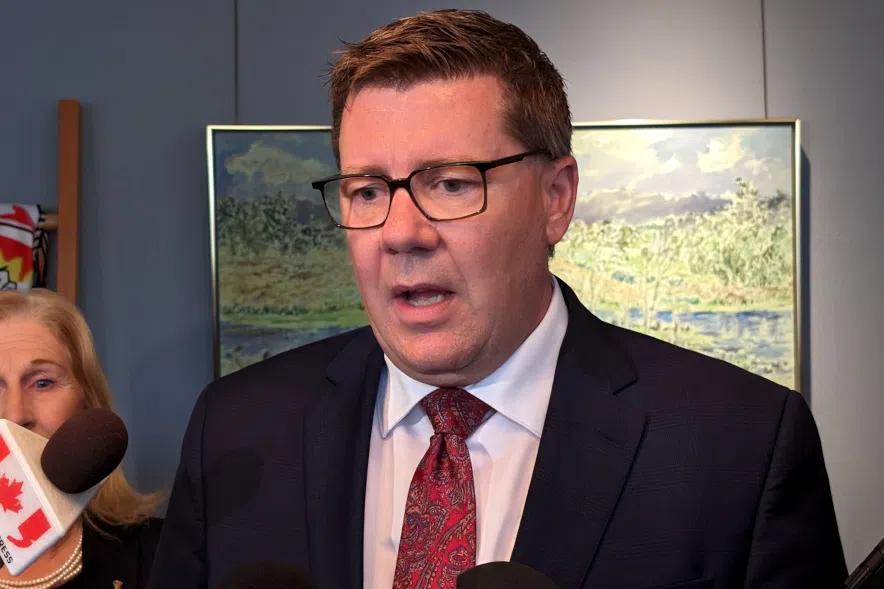A possible 25 per cent tariff on all goods coming from Canada to the U.S. had lawmakers scrambling on Tuesday.
Premier Scott Moe said such a tariff would have a huge impact on Saskatchewan, explaining that 60 per cent of the province’s exports go to the U.S.
“This is a very serious conversation and I would expect it’s one that’s going to dominate a lot of government’s time in the next number of weeks and months,” said Moe, speaking on the Evan Bray Show.
U.S. President-elect Donald Trump posted to his social media on Monday night, saying he would sign an executive order once he takes over, to impose a 25 per cent tariff on all products brought into the U.S. from Canada and Mexico. He wrote the tariff would stay in place until Canada and Mexico stop drugs – particularly fentanyl – and people from illegally crossing the borders.
Listen to Evan Bray’s full interview with Premier Scott Moe:
On Tuesday morning, Moe said his government is actively pursuing three points of engagement to respond to the possible tariffs. The first included working with the federal government and the outreach it’s been doing.
U.S. needs what Saskatchewan sends, says expert
Chris Decker, CEO of the Saskatchewan Trade and Exports Partnership, said Saskatchewan isn’t strictly reliant on the States.
“We have to put these things into perspective. And the fact is, the Saskatchewan economy relies on exports to international markets to grow and to succeed economically, Decker said.
“And while the U.S. is our No. 1 customer, we are among the provinces that are the least reliant on the U.S. market, with about half of our exports being shipped across the border. The national average is around 77 per cent, with provinces like Alberta and Ontario Quebec well above 80 per cent so whenever you have a barrier to doing business, trade, and exports to markets around the world — particularly to one as large as the United States — it’s troublesome to be sure,” he said.
Decker said that the many of the things our province sends Stateside are greatly needed by the Americans.
“About 80 per cent of what we ship to the United States is oil, potash, canola products, uranium, grains and oil seeds. So those are items that are of great interest to the American market. They need what Saskatchewan has for their growing economy,” said Decker.
Decker said things could change, and significant effects would not be felt until after any tariffs were introduced.
“There would be no immediate consequences. Obviously, there’s a lot of time between now and (Trump’s) first day in office, and there’s a lot of weeks of talks and negotiations and discussions. So the immediate impact is just uncertainty — the kind of uncertainty that these kinds of tariffs and these kinds of impacts on a substantive trading relationship between two large markets creates for business,” said Decker.
Meeting with Trudeau requested
Prime Minister Justin Trudeau said he’d had a call with Trump on Monday night to talk about the connections between the two countries. Trudeau is also reportedly planning to call a meeting with the country’s premiers to respond to the tariff threat.
Moe said his government is also working with the Council of the Federation, the group of Canada’s premiers.
“We are already looking at how we can engage with the contacts we collectively have at that table,” said Moe.
The council sent a letter asking Trudeau for a meeting to discuss Canada-U.S. relations earlier this week.
The premier said the province is also reaching out to its own contacts to talk about this possibility, particularly mentioning Doug Burgum, who was named to head Trump’s National Energy Security Council and was previously the Governor of North Dakota for a number of years.
Moe said there might be a call set up to talk about the issue later on Tuesday.
While Moe said the proposed tariffs would harm Saskatchewan’s economy and “drive up prices on both sides of the border,” the premier also noted that increased border security would benefit both nations.
“As Canadians, we can all benefit from additional border security stopping the flow of illegal drugs and migrants across our borders,” Moe wrote on Tuesday in a post shared to social media.
— with files from Roman Hayter, 980 CJME











